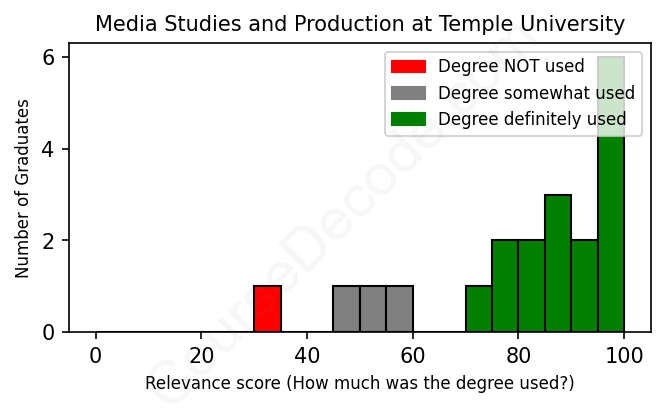
First, some facts. Of the Media Studies and Production graduates from Temple University we've analyzed , here's how many have used (or NOT used) their degree in their career:

These are estimates based on AI analysis of 20 LinkedIn profiles (see below).
The verdict? Significantly above average. Overall, with an average relevance score of 81%, Media Studies and Production graduates from Temple University have a much higher likelihood (+14%) of finding work in this field compared to the average graduate across all fields:
And for comparison, here's the chart for all profiles we've looked at across all degrees.
Also, after graduating, only 10% of these graduates have pursued further education other than another Bachelor's degree (such as a Masters degree or other), compared to the average across all profiles of 35%. This suggests a Bachelors degree is enough for most Media Studies and Production graduates, and it's normal to look for work straight after graduation.
See the details:
|
Relevance score: 93% We think this person has gone into a career highly relevant to their degree. We think this person has gone into a career highly relevant to their degree.
DEGREE INFOGraduated in 2020 from Temple University with a Bachelor of Arts - BA in Media Studies and Production. No other secondary education since. JOB HISTORY SINCE GRADUATIONCOVID-19 Special Coverage Reporter Klein College of Media and Communication Jun 2020 - Aug 2020 Supervising Producer  Temple Update Jul 2020 - Dec 2020 Production Assistant  NBCUniversal Media, LLC Sep 2020 - Dec 2020 News Producer  Waterman Broadcasting Of Florida LLC Jan 2021 - Jun 2023 Secretary, Employee Engagement Committee  Waterman Broadcasting Of Florida LLC Jul 2022 - Jul 2023 News Producer  Hearst Television Jan 2021 - May 2024 Content Producer  NBCUniversal Jun 2024 - Present ABOUTMedia production has been a dream of mine since I was nine years old. Today, I am living my dream at NBC10 in Philadelphia!As a news producer, I have honed in on my writing and communication skills. I hope to educate and empower people with honest and accurate information.My primary professional goal is to continually learn, grow within the communication industry and build my network!Contact info:[EMAIL REMOVED](717) 421-6871 |
The top 10 most common jobs done by the graduates we've analyzed (ranked most common to least) are:
From the profiles of graduates from Temple University in Media Studies and Production, it’s clear that many have landed roles closely tied to their degree, particularly in media production, broadcasting, and journalism. Common job titles include News Producers, Content Producers, and various production-related positions like Video Editors and Audio Producers. These roles heavily rely on the critical skills taught in their programs, such as storytelling, video production, and audio editing. For instance, graduates have worked at notable companies and organizations, including NBC, CBS, and even NFL Films, showcasing how their educational background has provided a solid foundation for thriving careers in the media sector.
However, not all job placements are directly relevant to Media Studies and Production. Some graduates found themselves in positions like Office Assistants, Software Test Engineers, or various administrative roles, which don’t leverage their specialized media knowledge. While many did secure roles that directly use their skills, a notable number took paths that veered from the media landscape, reflecting a mixed landscape about how this degree translates into the job market. Overall, it's safe to say that while many Temple graduates are successfully applying their media training, there’s still a significant portion that is working outside their field of study, highlighting the diverse career paths available but also the importance of chasing those roles that genuinely connect back to their degree.
Here is a visual representation of the most common words in job titles for Media Studies and Production graduates (this is across all Media Studies and Production graduates we've analyzed, not just those who went to Temple University):

Graduates from Temple University's Media Studies and Production program seem to follow quite a diverse set of career trajectories, though many remain connected to media-related jobs. Right after graduation, it looks like a lot of them typically land their first jobs in positions like interns, production assistants, or entry-level roles in broadcasting and content production. For example, several of the 2016 and 2018 graduates started off as interns or in roles like audio producers and post-production coordinators, which is a solid way to get their feet wet in the industry. This hands-on experience seems to set them up well for future opportunities within the media realm.
Five to ten years down the line, many graduates appear to have moved into more specialized or higher-ranking positions. For instance, alumni have transitioned into roles like news producers, multimedia coordinators, and even management positions in production companies. However, not everyone sticks strictly to media; some have ventured into adjacent fields, like project management and audio digitization, which indicates a versatile skill set but could also mean they aren’t pursuing traditional media paths. Overall, it's a mixed bag, but many seem to be carving out meaningful careers within or related to the media sector, leveraging their Temple education effectively.
Getting a Bachelor’s degree in Media Studies and Production at Temple University is generally considered to be moderately challenging, but it really depends on your interests and strengths. If you’re passionate about media, storytelling, and working with technology, you might find the coursework engaging and enjoyable rather than super hard. That said, you'll definitely have to put in time for projects, learn the technical aspects of production, and collaborate with others. There are deadlines and some heavy lifting in terms of time management, especially if you want to be involved in hands-on production work. Overall, if you’re committed and interested, it should be a manageable experience!
Most commonly, in the LinkedIn profiles we've looked at, it takes people 4 years to finish a Bachelor degree in Media Studies and Production.
Looking at the job paths of these Temple University graduates in Media Studies and Production, it seems like some of them have managed to score decent salaries over time, while others are still working their way up. For instance, the ones who landed roles at places like NBCUniversal, QVC, or working as an associate producer have likely found better-paying jobs compared to those who stayed in more entry-level positions or freelance gigs for longer periods. It’s a mixed bag: while a few are on solid career tracks and probably making good money now, some started with internships and entry roles that don’t typically pay much. Overall, the potential for good earnings is there, especially in more established companies, but it can take a while to get to that point, so it really depends on the individual’s path and how quickly they climb the ladder!
Here is a visual representation of the most common words seen in the "about" section of LinkedIn profiles who have a Bachelor degree in Media Studies and Production (this is across all Media Studies and Production graduates we've analyzed, not just those who went to Temple University). This may or may not be useful:

Here are all colleges offering a Bachelor degree in Media Studies and Production (ordered by the average relevance score of their Media Studies and Production graduates, best to worst) where we have analyzed at least 10 of their graduates:
| College | Score | Count |
|---|---|---|
 Temple University Temple University
|
81 | 20 |